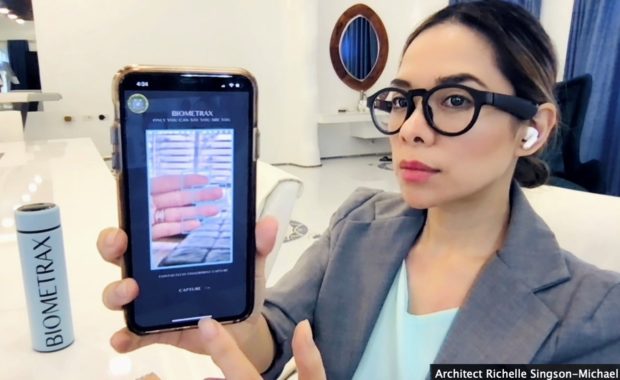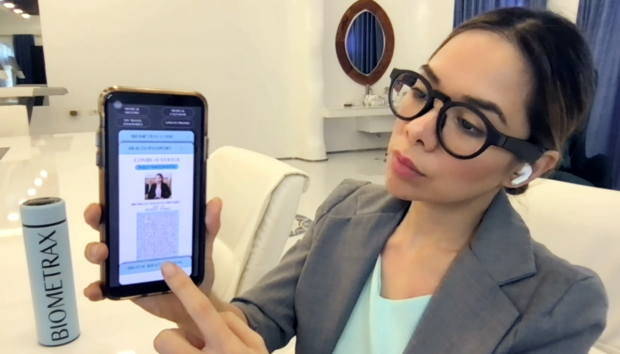Tech expert underscores the role of contactless biometric tracing technology in COVID-19 fight
After a year of spikes and plateaus in the country’s ongoing COVID-19 tally, the Philippines appears to be headed towards an alarming uptick in terms of new infections. With over 5,400 additional cases, the daily positivity rate has reached the highest level in 7 months, thus renewing the focus on a coordinated response system to the virus.
Based on the experiences of other countries, research has shown that COVID-19 cases begin to noticeably drop upon vaccination reaching over 25% of a given population. So far, the country has deployed vaccines made by Sinovac (China) and AstraZeneca (UK), with other brands lined up for approval.
According to technology expert and app developer Architect Richelle Singson-Michael, however, the vaccine roll-out must be complemented with a secure, accurate – and most especially, centralized – data tracking technology. “There were many crucial inefficiencies that were unveiled through our contact tracing experience,” she pointed out. “The main issue is that our present contact tracing apps do not have a verifiable identity link to the individual registering. Since people voluntarily input the details, there is a strong possibility that many entries are inaccurate, incomplete, duplicated or downright fake, in order to quickly enter an establishment,” she added. Moreover, in the event that someone tests positive, Architect Richelle likewise noted that “even though establishments are mandated to capture contact tracing info, it is still done manually, so the efforts are quite inefficient. Individuals enter tracing info repeatedly, establishments store data separately and there is no accurate centralized database that any system can automatically check against.”
In terms of tracing vaccination data, Architect Richelle believes that Biometric technologies are the ideal solution to the challenges of data inconsistency and integrity. “With a centralized Biometric database, it will be easier for the government to efficiently plan the vaccine roll out by accurately identifying individuals who have been tested or vaccinated,” she noted.
Architect Richelle is the Chief Executive Officer of Casha, Inc., an App Technology company that specializes in using biometric technology in their various applications to make identification easier and more consistent. Casha Inc. is currently proposing their BIOMETRAX app, which uses contactless biometric tracing technology, to assist and augment the government’s own contact tracing efforts.
Through BIOMETRAX, people can register their fingerprints and facial data via their mobile phones. BIOMETRAX then issues the user a unique cryptograph code, which has been designed to compress 250x more data than a QR code and is far more secure than an unencrypted QR Code.

Architect Richelle Singson-Michael, CEO of Casha Inc., presents how Biometrax, their Biometric Tracing Technology, can scan fingerprints with a camera phone. Biometrax was purposely made to make contact and vaccine tracing more manageable and less prone to fraud, especially when implemented at the national level.
The BIOMETRAX cryptograph stores the individual’s biometric data without needing internet connectivity and will serve as a Health Passport, making it easier to identify whether they have been vaccinated or not, whether they have previously contracted COVID-19, and other necessary information to assist in policy making and enforcement. Furthermore, unlike QR Codes, the BIOMETRAX code can only be read by authorized individuals and, more importantly, can only be read if the owner of the Health Passport authorizes the reader with his/her biometrics. Thus, through this system, the user holds their own data and must always be present to verify their own data, minimizing any fraud or misidentification.

Biometrax creates cryptographs (presented here by Architect Richelle) that are similar to QR codes but are more secure, portable, and accessible. Unlike QR codes, Biometrax’s cryptographs contain all the user’s inoculation and health-related data within it instead of being called from a server, so it can be used offline. The user’s unique cryptograph can only be updated if an authorized entity (such as a healthworker) applies the changes from an authorized device.
“With Biometric Tracing Technology like BIOMETRAX, we will be able to ensure that information for contact and vaccination tracing is always accurate, reliable, and never misused,” Architect Richelle emphasized. “Our technology is readily available and can easily help the country organize and centralize individual’s health data accurately. We can be an example to the world for a country that uses the latest technologies applied to health data management making our country safe and pandemic proof.” she concluded.
ADVT.